General Election: When covid took hold after the 2020 polls
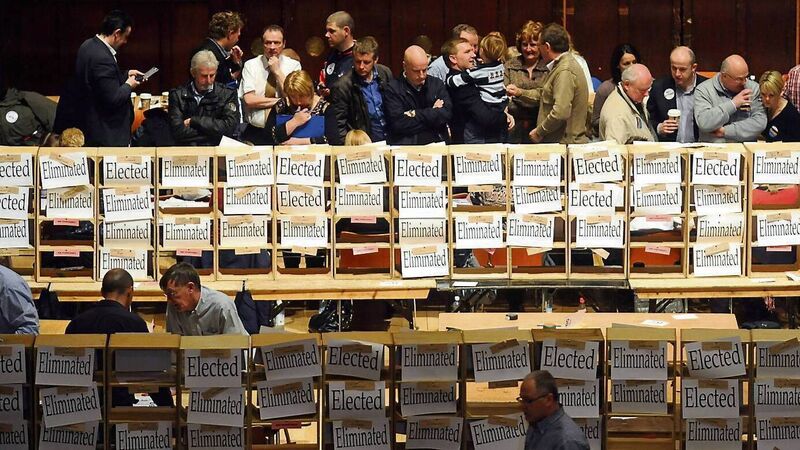
Fianna Fáil dropped six seats in 2020, leaving it with 38 seats, Sinn Féin got the highest percentage of the vote and gained 14, finishing on 37 seats, and Fine Gael lost 15 seats, leaving the party with 35 seats.
With Taoiseach Simon Harris expected to be granted a dissolution of the 33rd Dáil today by President Michael D Higgins, it could be argued that this is not the first general election caused by Mr Harris, given that he starred in the drama which led to the last one as well.
On January 9, 2020, Michael Collins, Independent TD for Cork South West, called for a motion of no confidence in Mr Harris, the then health minister, over what Mr Collins called the “unprecedented crisis” in the health service. The day before, the headline on The Echo had been “Hospitals in meltdown: Record number of patients on trolleys as surgeries cancelled”.
Mr Harris had, a year earlier, survived a confidence vote over his handling of the rising cost of the National Children’s Hospital, which had by then spiralled to a projected price tag of at least €1.7bn, up from the original €650m estimate. The day before the vote, Mr Harris told Newstalk that “the only scandal in relation to this would have been the decision to cancel the project”.
(Five years on, the Government in February of this year confirmed that the cost of the hospital had risen to €2.24bn, saying this would now be the “maximum allocation”.)
Fine Gael had led a minority government since the 2016 election, supported by Independent TDs and relying on a confidence and supply agreement with Fianna Fáil.
No-confidence vote
With a second no-confidence vote against Mr Harris looming in the first week of February 2020, taoiseach Leo Varadkar decided instead to call a snap election, seeking a dissolution of the 32nd Dáil on January 14, with the general election held on February 8, 2020, the first election held on a Saturday since 1918.
Nominations for candidates closed on Wednesday, January 22, with a record number of women nominated, 162 of the 531 candidates, making it the first Irish general election in which there was a female candidate running in every constituency.
Contesting a general election for the first time were Aontú, the Irish Freedom Party, the National Party, and, as part of Solidarity-People Before Profit, RISE.
As the Dáil gained two seats, going up to 160, 81 seats would now be needed for a majority.
A leaders’ debate scheduled for Tuesday, February 4, was initially restricted to Leo Varadkar and Micheál Martin until Sinn Féin threatened legal action if Mary Lou McDonald was excluded. The day before the debate, RTÉ announced that it had, in part in recognition of Sinn Féin’s standing in opinion polls, invited Ms McDonald to participate.
During a bad-tempered debate, Ms McDonald would deploy the phrase “Tweedledum and Tweedledee”, a characterisation she will almost certainly use again in the coming weeks.
During the campaign, both Fianna Fáil and Fine Gael ruled out going into coalition with Sinn Féin, although some in Fianna Fáil let it be known they would prefer Sinn Féin to their old Civil War enemies.
Priorities
On Friday, February 7, our main headline read: “It boils down to this”, as we listed the top five priorities for voters in the next day’s election: “1: The housing crisis; 2: Health service in crisis; 3: Serious crime on the rise; 4: Climate emergency heats up; and 5: Economy”. Above it was a smaller story entitled ‘CUH coronavirus result negative but alert continues’.
On Monday, February 10, The Echo headline was “Sinn Féin: They can’t ignore us now” under the banner “Thomas Gould declared ‘Taoiseach of the Northside’”. The next day, we ran with “Burke finally gets his seat” as Fine Gael’s Colm Burke and Solidarity-People Before Profit’s Mick Barry took the final two seats in Cork North Central.
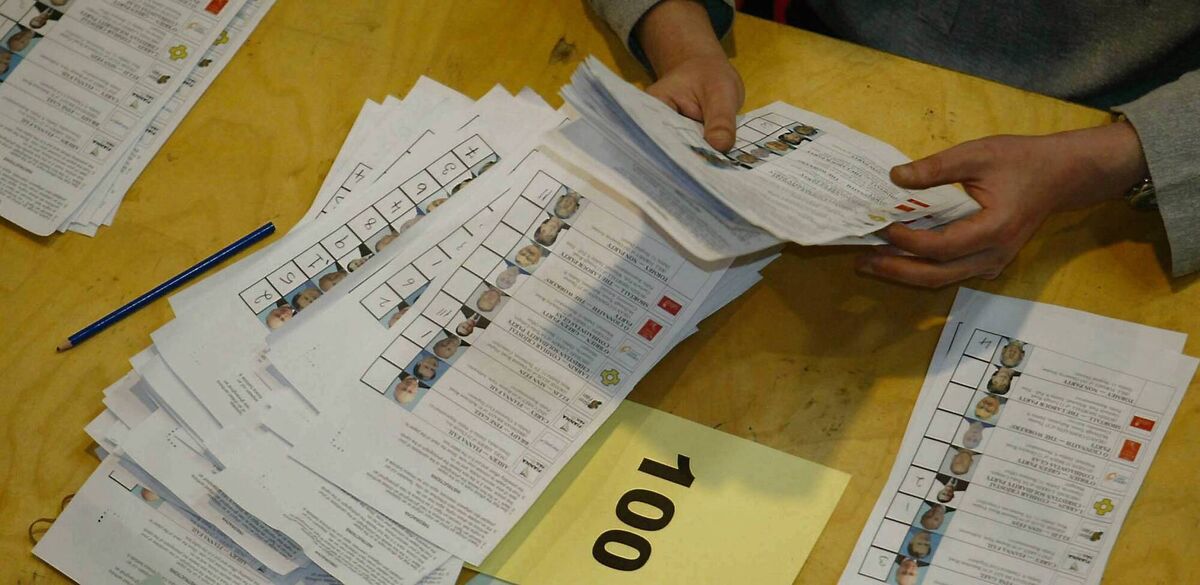
“A visibly emotional Mr Burke has been intermittently contesting Dáil elections since he first ran in 1982, and in a by-election in the constituency in 1994,” wrote Sarah O’Dwyer.
In the final result, Fianna Fáil dropped six seats, leaving it with 38 seats, Sinn Féin got the highest percentage of the vote and gained 14, finishing on 37 seats, and Fine Gael lost 15 seats, leaving the party with 35 seats. The Greens got 12 seats, the party’s best-ever result. The Social Democrats won six seats, while Labour — still unforgiven for its time in the austerity government with Fine Gael — dropped one seat to six. Solidarity-People Before Profit got five seats, and Aontú got one.
Government formation talks soon began, with Mr Varadkar continuing to rule out coalition with Sinn Féin, while Mr Martin softened in his opposition to the same proposal. For a time, opposition seemed to beckon for Fine Gael, with Mr Varadkar urging Sinn Féin to fulfil its mandate and build a coalition.
Sinn Féin did speak of a broad left coalition, but the numbers didn’t add up.
Independents
Even if they could wrangle Labour, the Social Democrats, the Greens, Solidarity-People Before Profit, and others into a room, they would still need the support of a dozen or more Independents, including the likes of Michael Lowry and the Healy-Raes, hard-working representatives rarely accused of being of the broad left.
On February 20, Mr Varadkar, having failed to be re-elected taoiseach, resigned, as he was constitutionally required to do, but he remained as acting taoiseach.
“Second case of virus is confirmed” was our headline on Wednesday, March 4. Two days later, we led with “Deadly virus is here” as a case of covid-19 was confirmed in CUH. A week later: “First covid virus death in Ireland”.
On March 12, Mr Varadkar, visiting US president Donald Trump in Washington, came down the steps of Blair House, the official guesthouse for visiting dignitaries, across the road from the White House, and announced that Ireland was to go into its first, partial lockdown.
“More people will get sick, and unfortunately, we must face the tragic reality that some people will die,” Mr Varadkar warned.
However, he said, there was hope. “Acting together, as one nation, we can save many lives.
“Ireland is a great nation. And we are great people. We have experienced hardship and struggle before.
“We have overcome many trials in the past with our determination and our spirit.
“We will prevail.”
Lockdown
On March 28, our headline read: “Ireland is in full lockdown: ‘Help us face greatest challenge of our lives’”.
Government formation talks would eventually rumble on for five months, well into June, when a draft programme for government was agreed between Fianna Fáil, Fine Gael, and the Green Party on June 20.
The office of taoiseach would rotate between Mr Martin and Mr Varadkar, with the Cork man serving as taoiseach for the first half of the term.
On June 16, we ran the headline “Following in Jack’s footsteps: Fianna Fáil leader Martin on brink of becoming next taoiseach”.
The next day, we led with “Cork Central to Cabinet: Martin’s constituency to become political powerhouse”, with Mr Martin refusing to be drawn on whether his Cork South Central rivals Simon Coveney and Michael McGrath would serve in the next Government.
On June 26, Fine Gael voted 80%, Fianna Fáil voted 74%, and the Green Party voted 76% in favour of the programme.
The following day, our headline was “Martin said to be second Cork taoiseach”, a prediction which was proven correct: A Government was formed, and Mr Martin was elected taoiseach, to serve until December 2022.
Taoiseach
The Echo’s front page featured a smiling Mr Martin with his wife Mary under the headline “Welcome home Taoiseach”, and the Ballinlough resident was quoted as saying: “Without my family and community, I could have achieved nothing.”
Mr Martin added: “I was blessed to be born into the home my late parents created for me and my brothers and sisters in the heart of close-knit, working-class community which I have the enormous privilege of serving in Dáil Éireann.”
On December 17, 2022, he would resign as taoiseach, and Mr Varadkar would be re-elected to the office. He would remain in the role until April 9, 2024, when Simon Harris would be elected Taoiseach.
In three weeks’ time, we will decide the shape of the 34th Dáil. Government formation talks, as we have seen, may take a little longer.
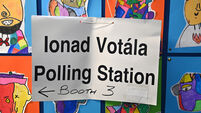



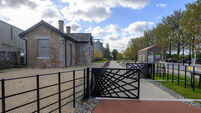

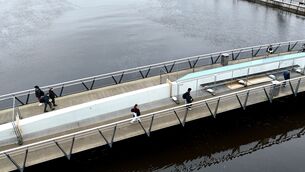



 App?
App?


